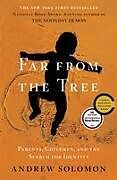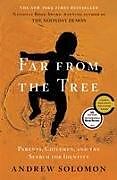Far from the Tree
Einband:
Fester Einband
EAN:
9780743236713
Untertitel:
Parents, Children, and the Search for Identity
Genre:
Lebenshilfe & Alltag
Autor:
Andrew Solomon
Herausgeber:
Simon & Schuster
Anzahl Seiten:
976
Erscheinungsdatum:
13.11.2012
ISBN:
978-0-7432-3671-3
Explores the consequences of extreme personal differences between parents and children, describing his own experiences as a gay child of straight parents while evaluating the circumstances of people affected by physical, developmental, or cultural factors that divide families.
#8220;Far from the Tree is a landmark, revolutionary book. It frames an area of inquiry—difference between parents and children—that many of us have experienced in our own lives without ever considering it as a phenomenon. Andrew Solomon plumbs his topic thoroughly, humanely, and in a compulsively readable style that makes the book as entertaining as it is illuminating.”
Autorentext
Andrew Solomon
Klappentext
A brilliant and utterly original thinker, Andrew Solomon's journey began from his experience of being the gay child of straight parents. He wondered how other families accommodate children who have a variety of differences: families of people who are deaf, who are dwarfs, who have Down syndrome, who have autism, who have schizophrenia, who have multiple severe disabilities, who are prodigies, who commit crimes, who are transgender. Bookended with Solomon's experiences as a son, and then later as a father, ...
Zusammenfassung
Winner of the National Book Critics Circle Award, a Books for a Better Life Award, and one of The New York Times Book Review’s Ten Best Books of 2012, this masterpiece by the National Book Award–winning author of The Noonday Demon features stories of parents who not only learn to deal with their exceptional children, but also find profound meaning in doing so—“a brave, beautiful book that will expand your humanity” (People).
Solomon’s startling proposition in Far from the Tree is that being exceptional is at the core of the human condition—that difference is what unites us. He writes about families coping with deafness, dwarfism, Down syndrome, autism, schizophrenia, or multiple severe disabilities; with children who are prodigies, who are conceived in rape, who become criminals, who are transgender. While each of these characteristics is potentially isolating, the experience of difference within families is universal, and Solomon documents triumphs of love over prejudice in every chapter.
All parenting turns on a crucial question: to what extent should parents accept their children for who they are, and to what extent they should help them become their best selves. Drawing on ten years of research and interviews with more than three hundred families, Solomon mines the eloquence of ordinary people facing extreme challenges.
Elegantly reported by a spectacularly original and compassionate thinker, Far from the Tree explores how people who love each other must struggle to accept each other—a theme in every family’s life.
Leseprobe
Far From the Tree
III
Dwarfs
Until I attended my first dwarf convention—the 2003 Little People of America (LPA) meeting in Danvers, Massachusetts—I had no clue how many kinds of dwarfism there are, nor how many varieties of appearance are collected under the category. Dwarfism is a low-incidence condition, usually occurring because of a random genetic mutation. Since most dwarfs are born to average-height parents, they do not have vertical community. There has been occasional talk about building a town for little people (LPs); there are metropolises where activist LPs have settled; there are high concentrations of otherwise rare dwarfing conditions among the Amish; but there has never been a significant geographic concentration of people of short stature. This means that the national LPA gatherings are not simply occasions to attend lectures and consult medical experts; for some participants, they are the annual exception to a certain kind of loneliness. The gatherings are emotionally intense; one dwarf I met told me she was “happy for one week a year,” although others emphasized that they love both of their lives—the one in the larger world, and the one among their LPA friends. More than 10 percent of Americans of short stature belong to LPA, and the organization has a role in the LP community that is greater than that of similar groups for comparable populations.
Arriving at the Sheraton Ferncroft Resort, where the convention was taking place, I was struck by how the concentration of LPs changed my perception of them. Instead of seeing, primarily, short stature, I saw that one was exceptionally beautiful, that one was unusually short even for a dwarf, that one laughed uproariously and often, that one had an especially intelligent face—and so I began to recognize how generically I had responded to little people until then. I understood what a relief it had to be for them that no one was focused on their height. Of course, the LPA convention was all about stature, but it was also the place where stature became blessedly irrelevant.
It would be difficult for an outsider to acknowledge this particularizing view of, for example, Latinos or Muslims. To say that a person’s ethnicity or religion had overwhelmed, even temporarily, one’s ability to appreciate his other personal characteristics would seem bigoted. But dwarfism has been the exception to these social rules. According to Betty Adelson, author of The Lives of Dwarfs and Dwarfism, “The only permissible prejudice in PC America is against dwarfs.” Mary D’Alton, chair of Columbia University’s Department of Obstetrics and Gynecology and a leader in the field of high-risk pregnancy, told me that dwarfism is the most difficult diagnosis to communicate to expectant parents. “You say that the baby has a hole in his heart,” she said, “and they say, ‘But you can fix that, right?’ But when I tell someone that they will be having a dwarf, they often seem disgusted by the idea.”
Many of the attendees I met my first day at LPA could identify instantly conditions that I had never heard of or imagined and had certainly never seen. When I went down to the conference disco the first night, I saw a brother and sister who had primordial dwarfism; they were full-grown, perfectly proportioned, and only about twenty-nine inches high. Their parents stood with them to make sure they weren’t trampled—a danger even at the dwarf convention. I learned that the girl played percussion in her high school band; she had a classmate who pushed her tiny wheelchair, and she held the drum in her lap—looking, in the words of a dwarf who was herself just three foot eight, “like a marionette.” The conference featured athletic competitions; a marathon-length talent show, including acts from Christian music to break dancing; and a fashion show, which revealed a broad range of dressy and casual styles, all tailored to little bodies. The conference also provided an eagerly awaited opportunity for dating. A dwarf comedian cracked, “You know you’re a teenager at LPA if you’ve had more boyfriends this week than you’ve had in the last year.”
• • •
When I met Mary Boggs on my second day at LPA, she told me that the organization had changed her life. When her daughter Sam was born in 1988, the obstetrician initially assumed that the baby’s diminutive size was a result of her premature arrival. A month later, while she was still in the neonatal intensive care unit, he diagnosed her with achondroplasia. “We would have rather had a child that was deaf or blind,” Mar…

Leider konnten wir für diesen Artikel keine Preise ermitteln ...
billigbuch.ch sucht jetzt für Sie die besten Angebote ...
Die aktuellen Verkaufspreise von 6 Onlineshops werden in Realtime abgefragt.
Sie können das gewünschte Produkt anschliessend direkt beim Anbieter Ihrer Wahl bestellen.
Loading...
Die aktuellen Verkaufspreise von 6 Onlineshops werden in Realtime abgefragt.
Sie können das gewünschte Produkt anschliessend direkt beim Anbieter Ihrer Wahl bestellen.
| # | Onlineshop | Preis CHF | Versand CHF | Total CHF | ||
|---|---|---|---|---|---|---|
| 1 | Seller | 0.00 | 0.00 | 0.00 |
